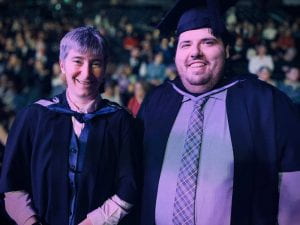Douglas Gregg, School of Environment and Technology, has been awarded the university’s Environmental Award for Winter 2020.
Douglas’ dissertation for his Masters in Geographical Information Systems and Environmental Management, modelled atmospheric nitrogen oxide using Geographical Information Systems (GIS).
Within Europe, between 14% and 65% of the population find themselves exposed to atmospheric pollutant concentrations which breach EU legislated and World Health Organisation recommended limits. Some 40,000 deaths per year are attributable to poor air quality, with 11,000 of these deaths caused by high concentrations of atmospheric Nitrogen Dioxide (NO2). Douglas’s work used a satellite (Sentinel-5P) to model concentrations of atmospheric NO2 within the United Kingdom, and was found to be particularly effective in rural areas.
Douglas’ project in modelling this gas could allow greater understanding of pollutant concentrations in rural areas, and also less developed nations. Douglas hopes that this work could go on to inform national work on air quality, driving improvements and the lives of those effected by high concentrations of atmospheric pollutants.
The Environmental Award panel chose Douglas’ project as the winner, as they were excited by the potential of this project in future modelling and the positive impact it could have on improving air quality and reducing atmospheric pollution.
Douglas as commented on winning the Environmental Award;
“I’m so excited to receive the Environmental Award, and it truly is a great privilege to see the culmination of my work recognised by the wider university. Air quality is such an important global issue, impacting the lives of people across the globe.
My project explored whether TROPOMI, an instrument aboard the Sentinel-5P satellite lauched in October 2017, could be utilised to model concentrations of Nitrogen Dioxide across Great Britain, and found that TROPOMI had particular strength in modelling concentrations within rural areas. As the data is freely available and open source software is capable of creating the models, this potentially has wide applications across the globe.
I very much enjoyed undertaking this research project and am keen to continue with further investigations. Receiving the Environmental Award has further encouraged and inspired me, and I’m really excited to see what the future holds!”
Following graduation, Doug has joined the University of Brighton Sustainability Team .
Applications for the Summer Environmental Award, for those graduating in August 2020, will open in the spring and details will be shared on the Environmental Award webpages: https://blogs.brighton.ac.uk/environmentalaward/


